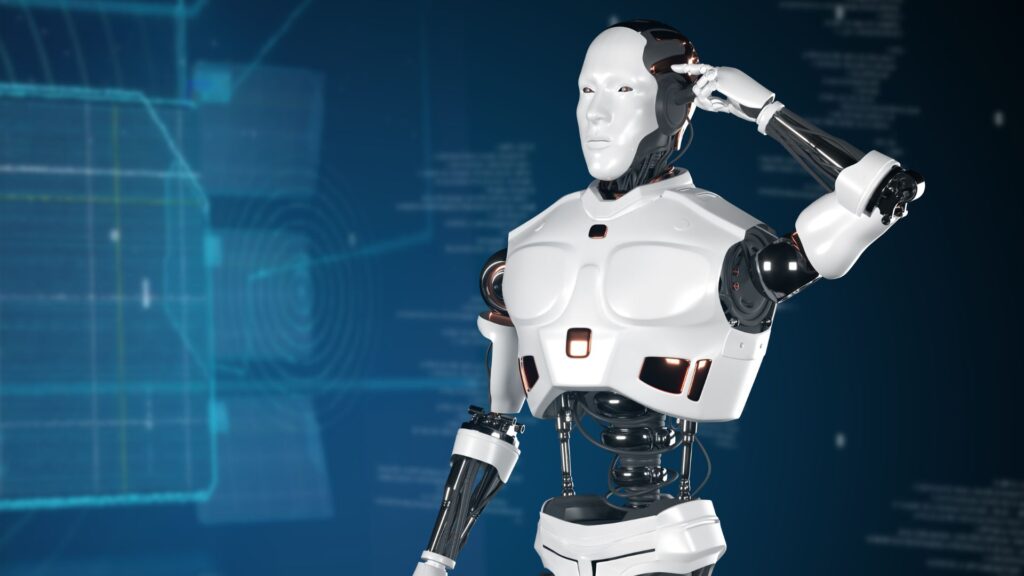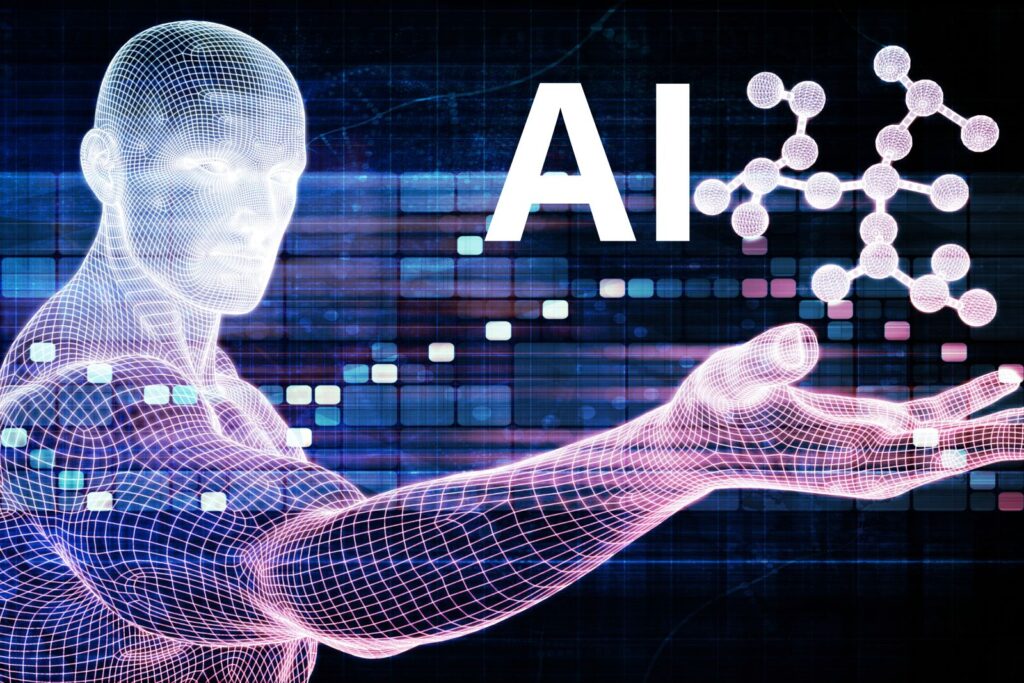Introduction:
In recent years, artificial intelligence (AI) has rapidly transformed how industries operate, and content creation is one of the areas where its impact is becoming increasingly evident. From writing blog posts to automating social media content, AI is revolutionizing the way brands and marketers approach their content strategies.
But what does this transformation mean for the future of content creation? Is AI destined to take over the entire content production process, or will human creativity always have a role to play? Let’s take a deep dive into the rise of AI in content creation, exploring its tools, benefits, challenges, and future potential.
What is AI in Content Creation?
At its core, AI in content creation involves the use of machine learning algorithms and natural language processing (NLP) to generate or assist in creating written content. These technologies analyze vast amounts of data, understand context, and produce human-like text with minimal input. AI can now generate blog posts, news articles, marketing copy, and even poetry, making it a versatile tool for content marketers.
Historically, AI played a background role, assisting with tasks like grammar checking (e.g., Grammarly) or keyword suggestion. However, modern advancements, especially the development of models like GPT-4 (Generative Pretrained Transformer) by OpenAI, have moved AI beyond simple assistance to full-fledged content generation.
AI content generation isn’t just about spitting out words; it’s about creating coherent narratives based on given inputs. These technologies have evolved to understand tone, voice, and context, making it easier for businesses and content creators to scale their production efforts without sacrificing quality.
How Does AI Generate Content?
AI content generation works through machine learning. These models are trained on large datasets containing books, websites, articles, and more. The model learns language patterns, grammar, structure, and context by analyzing this data. Once trained, AI can generate new content by predicting what words, sentences, or paragraphs should come next, based on the prompt it receives.
While AI can generate a wide range of content, it still lacks the creative intuition and emotional intelligence that human writers bring. This distinction is critical in understanding the current and future roles of AI in content creation.
How AI is Transforming Content Creation
The rise of AI-powered tools is reshaping the landscape of content marketing. Whether it’s blog writing, social media posts, product descriptions, or personalized marketing emails, AI is now capable of automating a variety of content creation tasks.
Here are some key ways AI is transforming content creation:
1. Automating Content Production
One of the most significant benefits of AI in content creation is the ability to automate high-volume content production. Marketers and businesses no longer need to rely solely on human writers to churn out blog posts or marketing materials. AI can handle this task quickly and efficiently, saving time and resources.
For example, companies like The Washington Post and Associated Press use AI to produce routine news reports, such as earnings reports or sports recaps, where the content follows a predictable format. AI-generated content for such tasks can be completed in minutes, allowing journalists and writers to focus on more in-depth and creative stories.
2. Personalization and AI-Driven Recommendations
Personalization has become a key factor in content marketing. Consumers today expect content tailored to their preferences and behaviors. AI enables brands to deliver personalized content experiences by analyzing user data, such as search history, past interactions, and demographic information.
By leveraging AI-driven content recommendations, companies can present the right content to the right audience at the right time. This personalized approach improves engagement, increases conversion rates, and helps build stronger customer relationships.
For example, platforms like Netflix and Spotify use AI algorithms to recommend content based on user preferences. Similarly, AI content tools can recommend blog topics, article structures, or product descriptions based on audience insights, making content creation more targeted and effective.

3. Real-Time Content Creation
AI can generate content almost instantly, allowing businesses to respond quickly to trends, news, or events. Brands no longer have to wait for a team of writers to draft a response to breaking news; AI can do it in seconds. This speed is crucial in today’s fast-paced digital environment, where timing can make or break a piece of content.
AI-Powered Tools for Content Creation
Several AI-powered tools are now available to help content creators and marketers automate and optimize their workflows. Here are some of the most popular AI content creation tools on the market today:
1. GPT (Generative Pretrained Transformer)
OpenAI’s GPT-4 is one of the most advanced AI models for generating human-like text. GPT-4 can write blog posts, technical articles, marketing copy, and even creative pieces like poetry and fiction. Its versatility has made it a go-to tool for content creators looking to scale their efforts without compromising quality.
https://blissfultrend.com/how-to-earn-money-online-no-investment-2024
2. Jasper AI
Jasper AI is a popular tool used by content marketers to create blog posts, social media captions, and email copy. Jasper uses AI to generate ideas, outline content, and write drafts. It’s particularly useful for creating SEO-optimized content, thanks to its keyword integration capabilities.
3. Copy.ai
Copy.ai is an AI tool that excels at creating short-form content such as product descriptions, ad copy, and social media posts. With simple input, it can generate a variety of content tailored to different formats, tones, and audiences.
4. Writesonic
Writesonic is another AI tool designed for blog and article writing. It uses AI to generate long-form content, helping writers and marketers produce well-researched articles quickly. It’s also equipped with features for creating SEO-friendly content, making it a favorite among digital marketers.
These tools have become essential for businesses looking to streamline their content creation process and scale production without sacrificing quality or SEO optimization.
Benefits of Using AI for Content Creation
The benefits of AI in content creation are clear, and businesses across industries are beginning to leverage these advantages to stay competitive in the digital landscape.
1. Improved Efficiency and Productivity
One of the most significant benefits of using AI for content creation is its ability to increase productivity. AI tools can generate content faster than human writers, allowing businesses to produce high volumes of content in a fraction of the time.
For example, a human writer might take several hours to write a blog post, while an AI content generator like Jasper or GPT-4 can create a draft in minutes. This efficiency helps businesses keep up with the increasing demand for content in today’s digital world.
2. Cost-Effective Content Generation
Hiring content writers or freelancers can be expensive, especially for small businesses or startups. AI provides a cost-effective alternative by automating content creation tasks that would otherwise require significant human labor. Businesses can generate product descriptions, social media posts, and even blog articles without needing to hire additional staff.
3. Enhanced SEO and Keyword Optimization
AI tools are excellent at optimizing content for SEO. Many AI-powered platforms can perform keyword research, suggest high-ranking terms, and help structure articles in a way that boosts visibility on search engines.
For example, Jasper AI can automatically generate SEO-friendly blog posts by integrating keywords, optimizing meta descriptions, and structuring content for better readability. This process ensures that content not only reads well but also ranks well on search engine results pages (SERPs).
Challenges and Limitations of AI in Content Creation
Despite the many benefits, there are still some notable challenges and limitations to using AI for content creation. These limitations remind us that while AI is a powerful tool, it cannot fully replace human writers—at least not yet.

1. Lack of Creativity and Emotional Intelligence
AI excels at producing well-structured, fact-based content, but it often struggles with creativity and emotional depth. Human writers have the ability to craft unique narratives, evoke emotions, and write with a personal touch that AI simply cannot replicate. While AI can generate content based on patterns, it lacks the ability to think outside the box or offer original insights.
For example, AI might be able to generate an informative blog post on a technical subject, but it may not be able to write a compelling story that resonates emotionally with readers.
2. Ethical Considerations and Copyright Issues
Another challenge associated with AI-generated content is the risk of plagiarism and copyright infringement. Since AI models are trained on existing data, there’s always a risk that the content they generate could be too similar to existing work. Additionally, some people argue that AI-generated content can raise ethical concerns, particularly when it comes to ownership and originality.
3. Limited Understanding of Context and Nuance
AI is great at producing content based on specific inputs, but it often struggles with understanding nuance and context. For example, AI might generate a grammatically correct sentence that makes sense on its own but lacks the deeper context required to fully address a topic. This limitation means that AI-generated content may sometimes require human editing and refinement to ensure it truly resonates with the target audience.
AI and Human Collaboration in Content Creation
While AI offers numerous benefits in terms of speed and efficiency, the best results often come from collaboration between AI and human writers. Rather than viewing AI as a replacement for human creativity, it’s better to see it as a tool that enhances the content creation process.
1. Using AI to Generate Drafts
One effective way to collaborate with AI is by using it to generate initial drafts. AI can quickly produce a rough outline or first draft of a blog post, which human writers can then refine and polish. This approach saves time while ensuring the final product retains the creative and emotional touch that only humans can provide.
2. Human Oversight for Quality and Tone
Human writers play a crucial role in ensuring that AI-generated content aligns with the brand’s tone and voice. While AI can produce technically accurate content, it may not always match the desired style or tone. Human oversight is necessary to adjust the language, add nuance, and ensure the content resonates with the target audience.

AI in SEO and Keyword Optimization
In addition to content creation, AI is revolutionizing the world of search engine optimization (SEO). Many AI-powered tools come equipped with features that help marketers optimize their content for better search engine rankings.
1. AI-Driven Keyword Research
AI tools like Surfer SEO and Frase can perform keyword research by analyzing competitors, search trends, and user behavior to suggest high-ranking keywords for your content. These tools can identify keyword gaps in your industry and recommend terms that have the potential to drive traffic.
2. On-Page SEO Optimization
Many AI writing tools also include features for on-page SEO optimization. For example, AI can help structure blog posts with keyword-optimized headings, suggest meta descriptions, and even recommend internal and external links that improve the content’s SEO value.
3. AI-Powered Content Optimization
Once the content is written, AI tools can analyze it for readability, keyword density, and structure. Tools like Yoast SEO and Clearscope provide real-time feedback, helping writers optimize their content for search engines while maintaining a natural flow for readers.
Case Studies: Brands Using AI for Content Creation
Several major brands have successfully integrated AI into their content creation strategies. Here are a few examples:
1. The Washington Post
The Washington Post has been using its AI-powered system, Heliograf, to write short news reports. Heliograf is capable of generating news articles for events such as elections and sports recaps, allowing the newspaper to deliver real-time news coverage while freeing up human journalists to focus on more in-depth reporting.
2. HubSpot
HubSpot uses AI tools to optimize its content strategy, from automating marketing emails to generating blog ideas. The brand also uses AI-driven insights to personalize content for its audience, improving engagement and conversion rates.
3. Alibaba
E-commerce giant Alibaba uses AI to generate product descriptions for its online platform. By leveraging AI, Alibaba can create thousands of product descriptions quickly, ensuring that each item on its marketplace has optimized, SEO-friendly content.
These case studies show how AI can be a powerful tool for automating and enhancing content creation at scale.
Future of AI in Content Creation
Looking ahead, AI’s role in content creation will likely continue to expand. As machine learning models become more sophisticated, AI will be able to handle even more complex tasks, such as writing longer-form content, generating video scripts, and creating personalized marketing campaigns in real-time and make money online.

1. Advanced Personalization
In the future, AI will become even better at delivering hyper-personalized content to users. With access to more data and improved algorithms, AI will be able to craft messages that are tailored to individual preferences, behaviors, and needs.
2. AI-Powered Creativity
While AI currently struggles with creativity, future developments may allow it to create more innovative and unique content. As AI models learn from more diverse data sets, they may begin to develop a better understanding of creative writing and storytelling techniques, allowing them to produce content that is both engaging and original.
Is AI Replacing Human Writers?
One of the most debated topics in the world of content creation is whether AI will eventually replace human writers. While AI is certainly making strides in automating many writing tasks, the idea that it will fully replace human writers is unlikely—at least in the near future.
1. AI for Repetitive Tasks
AI excels at handling repetitive, data-driven tasks like generating product descriptions or writing technical documentation. These tasks don’t require much creative input, making them ideal for automation. By taking over these more mundane tasks, AI allows human writers to focus on more complex and creative projects.
2. The Need for Human Creativity
No matter how advanced AI becomes, it will always lack the ability to replicate true human creativity. Human writers bring emotional intelligence, unique perspectives, and the ability to connect with readers on a deeper level. AI may be able to assist with content creation, but it cannot replace the imaginative and intuitive thinking that human writers provide.
How to Integrate AI in Your Content Strategy
Integrating AI into your content strategy can help you create high-quality content more efficiently. Here are a few steps to get started:
1. Identify Tasks for Automation
Start by identifying the tasks that AI can automate. These might include keyword research, generating blog post drafts, or writing product descriptions. By automating these tasks, you can free up time for more creative work.
2. Choose the Right AI Tools
Not all AI tools are created equal. Research the different AI-powered tools available and choose one that fits your needs. For example, if you’re focused on blog writing, you might choose a tool like Jasper AI or Writesonic. If you’re focused on social media, a tool like Copy.ai might be more suitable.
3. Use AI to Assist, Not Replace
Remember that AI is a tool to assist in the content creation process, not replace it. Use AI to generate ideas, draft content, and optimize SEO, but always add your unique voice and perspective to ensure the content resonates with your audience.
Common Myths About AI in Content Creation
As AI becomes more prominent in the world of content creation, several myths and misconceptions have arisen. Let’s take a look at some of the most common myths about AI-generated content:
1. AI Can Fully Replace Human Writers
One of the biggest myths is that AI will completely replace human writers. While AI can automate certain writing tasks, it still lacks the creativity, intuition, and emotional depth that human writers bring. AI is best seen as a tool to assist with content creation, not a replacement for human talent.
2. AI-Generated Content Is Plagiarized
Another misconception is that AI-generated content is always plagiarized. While AI models are trained on existing data, they generate new content based on patterns they’ve learned. That said, it’s still important for human editors to review AI-generated content to ensure originality and avoid potential issues with copyright.
3. AI Can Only Create Short-Form Content
Many believe that AI can only generate short-form content, like product descriptions or social media posts. However, modern AI tools are capable of producing long-form content, such as blog posts, articles, and even research papers. While the quality may vary, AI has proven to be a valuable asset in producing longer pieces of content.

Conclusion
The rise of AI in content creation is an exciting development that offers numerous benefits, from increased productivity and efficiency to enhanced SEO and personalization. However, while AI content tools can automate many aspects of content production, they are most effective when used in collaboration with human writers. By combining the speed and accuracy of AI with the creativity and emotional intelligence of human talent, businesses can create engaging, SEO-optimized content that resonates with their audience.
Looking to the future, AI will continue to play a significant role in content marketing, offering even more advanced personalization, real-time content creation, and data-driven insights. But no matter how advanced AI becomes, the need for human creativity and oversight will remain. By embracing AI-human collaboration, content creators can leverage the best of both worlds to create content that stands out in an increasingly competitive digital landscape.
FAQs:
What is AI in content creation?
AI in content creation refers to the use of machine learning algorithms and natural language processing to generate written content, such as blog posts, product descriptions, and social media posts.
Can AI fully replace human writers?
No, while AI can automate many writing tasks, it still lacks the creativity, emotional intelligence, and unique perspectives that human writers bring. AI is best used as a tool to assist in the content creation process.
How do AI tools improve content SEO?
AI tools can perform keyword research, suggest SEO-friendly structures, and optimize content for better search engine rankings. They can also analyze competitors and trends to help create targeted, high-ranking content.
What are the challenges of using AI in content creation?
Challenges include the lack of creativity in AI-generated content, potential ethical concerns around plagiarism, and limited understanding of context and nuance. Human oversight is necessary to ensure quality and originality.
. What are some popular AI content creation tools?
Popular AI tools for content creation include GPT-4, Jasper AI, Copy.ai, and Writesonic. These tools can assist with blog writing, social media content, product descriptions, and SEO optimization.



2 Responses